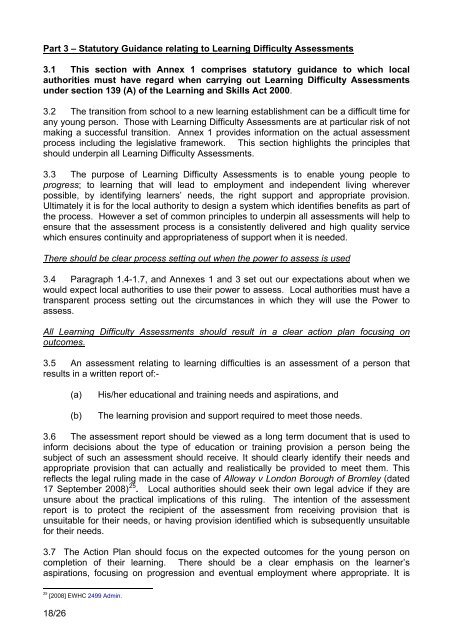Supporting young people with learning difficulties to participate and ...
Supporting young people with learning difficulties to participate and ...
Supporting young people with learning difficulties to participate and ...
You also want an ePaper? Increase the reach of your titles
YUMPU automatically turns print PDFs into web optimized ePapers that Google loves.
Part 3 – Statu<strong>to</strong>ry Guidance relating <strong>to</strong> Learning Difficulty Assessments<br />
3.1 This section <strong>with</strong> Annex 1 comprises statu<strong>to</strong>ry guidance <strong>to</strong> which local<br />
authorities must have regard when carrying out Learning Difficulty Assessments<br />
under section 139 (A) of the Learning <strong>and</strong> Skills Act 2000.<br />
3.2 The transition from school <strong>to</strong> a new <strong>learning</strong> establishment can be a difficult time for<br />
any <strong>young</strong> person. Those <strong>with</strong> Learning Difficulty Assessments are at particular risk of not<br />
making a successful transition. Annex 1 provides information on the actual assessment<br />
process including the legislative framework. This section highlights the principles that<br />
should underpin all Learning Difficulty Assessments.<br />
3.3 The purpose of Learning Difficulty Assessments is <strong>to</strong> enable <strong>young</strong> <strong>people</strong> <strong>to</strong><br />
progress; <strong>to</strong> <strong>learning</strong> that will lead <strong>to</strong> employment <strong>and</strong> independent living wherever<br />
possible, by identifying learners’ needs, the right support <strong>and</strong> appropriate provision.<br />
Ultimately it is for the local authority <strong>to</strong> design a system which identifies benefits as part of<br />
the process. However a set of common principles <strong>to</strong> underpin all assessments will help <strong>to</strong><br />
ensure that the assessment process is a consistently delivered <strong>and</strong> high quality service<br />
which ensures continuity <strong>and</strong> appropriateness of support when it is needed.<br />
There should be clear process setting out when the power <strong>to</strong> assess is used<br />
3.4 Paragraph 1.4-1.7, <strong>and</strong> Annexes 1 <strong>and</strong> 3 set out our expectations about when we<br />
would expect local authorities <strong>to</strong> use their power <strong>to</strong> assess. Local authorities must have a<br />
transparent process setting out the circumstances in which they will use the Power <strong>to</strong><br />
assess.<br />
All Learning Difficulty Assessments should result in a clear action plan focusing on<br />
outcomes.<br />
3.5 An assessment relating <strong>to</strong> <strong>learning</strong> <strong>difficulties</strong> is an assessment of a person that<br />
results in a written report of:-<br />
(a)<br />
(b)<br />
His/her educational <strong>and</strong> training needs <strong>and</strong> aspirations, <strong>and</strong><br />
The <strong>learning</strong> provision <strong>and</strong> support required <strong>to</strong> meet those needs.<br />
3.6 The assessment report should be viewed as a long term document that is used <strong>to</strong><br />
inform decisions about the type of education or training provision a person being the<br />
subject of such an assessment should receive. It should clearly identify their needs <strong>and</strong><br />
appropriate provision that can actually <strong>and</strong> realistically be provided <strong>to</strong> meet them. This<br />
reflects the legal ruling made in the case of Alloway v London Borough of Bromley (dated<br />
17 September 2008) 25 . Local authorities should seek their own legal advice if they are<br />
unsure about the practical implications of this ruling. The intention of the assessment<br />
report is <strong>to</strong> protect the recipient of the assessment from receiving provision that is<br />
unsuitable for their needs, or having provision identified which is subsequently unsuitable<br />
for their needs.<br />
3.7 The Action Plan should focus on the expected outcomes for the <strong>young</strong> person on<br />
completion of their <strong>learning</strong>. There should be a clear emphasis on the learner’s<br />
aspirations, focusing on progression <strong>and</strong> eventual employment where appropriate. It is<br />
25<br />
[2008] EWHC 2499 Admin.<br />
18/26
















